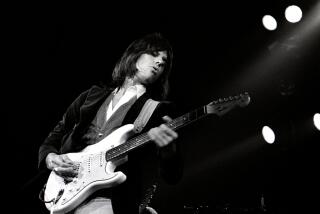The Flecktones Entertain in Eclectic Fashion
- Share via
Bela Fleck’s music may elude definition, but there’s no denying his capacity to put together an engaging performance.
On Wednesday night at UCLA’s Royce Hall, in one of the high points, thus far, of the Verizon Music Festival, the world’s most versatile banjo player led his group--the Flecktones--in more than 2 1/2 hours of music (without intermission), touching everything from bluegrass, rock, funk and jazz to a brief classical exposition.
The Flecktones have been together for more than a decade, with bassist Victor Wooten and his brother, percussionist Roy “Future Man” Wooten (who performs on his own unique invention, the Drumitar), in the quartet from the beginning, and saxophonist Jeff Coffin a more recent addition. Their longevity traces to an effective combination of group togetherness, individual instrumental virtuosity and well-planned programming.
Despite the length of the Royce performance, for example, Fleck and his players sustained audience interest by offering a quick-change series of contrasting elements. They began with several up-tempo numbers seemingly dedicated to the proposition that if fast is good, then faster is better. Then, rapidly shifting gears, they moved into a less frenetic, early Flecktone piece, the whimsically titled “Mars Needs Women.”
As the program continued, ensemble pieces were interspersed with lengthy solo inventions from each of the players: a funk-driven, string-snapping bass excursion by Victor Wooten; a kaleidoscopic display of percussion--both electronic and acoustic--by “Future Man”; a genre-leaping set of choruses from Coffin, in which he bounded from blues to avant-garde, doing a two-saxophones-at-the-same-time segment reminiscent of Rahsaan Roland Kirk; and Fleck’s own climactic spot, in which he included Bach, bluegrass, casual musical meandering and an audience sing-along in Lennon & McCartney’s “All You Need Is Love.”
It was, by any estimation, an impressive presentation, marred only occasionally by a tendency to base too much of the soloing, for too extended periods of time, upon repetitious vamp patterns.
But the Flecktones made up for this occasional transgression by also playing tunes with shifting, complex meters and colorful harmonies.
Whatever one chose to call it or define it, their music did an impressive job of walking the difficult razor’s edge between art and entertainment.
More to Read
The biggest entertainment stories
Get our big stories about Hollywood, film, television, music, arts, culture and more right in your inbox as soon as they publish.
You may occasionally receive promotional content from the Los Angeles Times.










